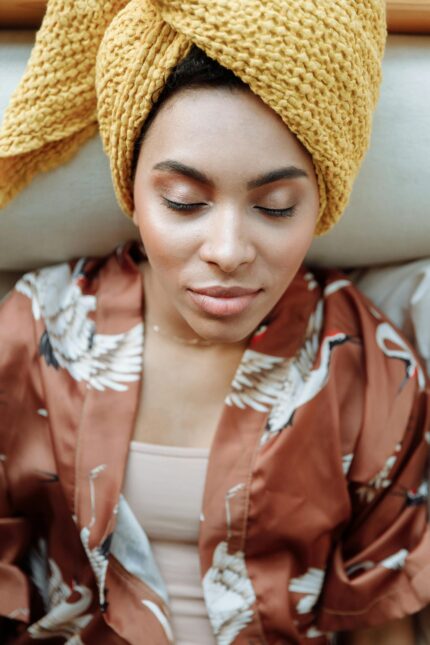 They say beauty sleep is real, but for Black folks, it’s deeper than that. Quality rest isn’t just about waking up refreshed—it’s a form of self-care, a tool for longevity, and a secret weapon for radiant, healthy skin. From battling hyperpigmentation to maintaining elasticity, sleep plays a critical role in the way our skin heals, glows and thrives. And yes, does mental health affect skin? It sure does. The connection between your mind and your skin is stronger than most people realize.
They say beauty sleep is real, but for Black folks, it’s deeper than that. Quality rest isn’t just about waking up refreshed—it’s a form of self-care, a tool for longevity, and a secret weapon for radiant, healthy skin. From battling hyperpigmentation to maintaining elasticity, sleep plays a critical role in the way our skin heals, glows and thrives. And yes, does mental health affect skin? It sure does. The connection between your mind and your skin is stronger than most people realize.The science is clear: when you don’t get enough sleep, your body produces more cortisol, the stress hormone that can wreak havoc on your skin. Higher cortisol levels trigger inflammation, which can lead to breakouts, can stress cause eczema, exacerbate conditions like psoriasis, and even speed up signs of aging. Does stress cause skin rash? Definitely—rashes, hives, and redness are common skin reactions when you’re overwhelmed or anxious. Sleep deprivation can also disrupt the skin’s ability to repair itself. During deep sleep, the body increases blood flow to the skin, allowing it to recover from the damage caused by UV rays, pollution and other environmental stressors. Without this restorative period, skin can appear dull, dry and tired.
For Black skin, which already faces unique challenges like transepidermal water loss and a heightened risk for keloids and hyperpigmentation, sleep is a game changer. When the body rests, it boosts collagen production, which helps maintain firmness and reduces fine lines. It also aids in cell turnover, the process that sheds dead skin cells and replaces them with new ones. This is crucial for fading dark spots and keeping an even tone, something many of us prioritize in our skincare routines. Getting adequate rest is part of a holistic approach that includes managing stress levels and practicing a diet for better skin to support a glowing complexion.
BlackLove.com Related Articles:
Can Stress Permanently Damage Your Skin? What to Expect Over Time
Black Pioneers Who Revolutionized Skincare and Beauty
The key to better sleep and, in turn, better skin is creating a nighttime routine that works for you. That means setting boundaries around bedtime, limiting blue light exposure before sleep and prioritizing relaxation. Simple habits, like winding down with a cup of chamomile tea, using silk pillowcases to reduce friction, and moisturizing with hydrating ingredients like hyaluronic acid and shea butter, can make all the difference. Keeping your bedroom cool and dark also promotes deeper sleep, which maximizes the skin’s overnight repair process—and may help prevent flare-ups.
Diet for better skin and hydration matter, too. Drinking enough water throughout the day keeps skin plump and elastic, while foods rich in antioxidants—think berries, leafy greens and nuts—support skin regeneration. Omega-3s, probiotics, and vitamins A, C, and E are also key players in any diet for better skin, especially when paired with consistent sleep. Alcohol and excessive caffeine, on the other hand, can interfere with sleep quality and contribute to dehydration, making skin look less vibrant.
For those who struggle with falling asleep, mindfulness practices like meditation, journaling or deep breathing exercises can be helpful. Studies show that reducing stress before bed can lower cortisol levels, allowing for more restful sleep and, in turn, healthier skin. And if you’re still asking yourself, does stress cause skin rash, the answer is yes—and stress-reducing habits can make a big difference in calming the skin and the mind.
Sticking to a consistent sleep schedule, even on weekends, helps regulate the body’s internal clock and improves sleep quality over time. If you’re focusing on total wellness, that means combining rest, hydration, mindfulness, and a diet for better skin to keep your glow strong from the inside out.
The connection between sleep and skin health isn’t just about aesthetics—it’s about overall well-being. When we prioritize rest, we give our bodies the chance to restore and replenish. For Black folks, who often navigate stressors that impact both mental and physical health, sleep is an essential part of the wellness equation. It’s about more than looking good—it’s about feeling good, inside and out. Prioritizing sleep is a radical act of self-love, and your skin will thank you for it. Because at the end of the day, when you’re asking does mental health affect skin, the answer is a resounding yes.










JOIN THE CONVERSATION